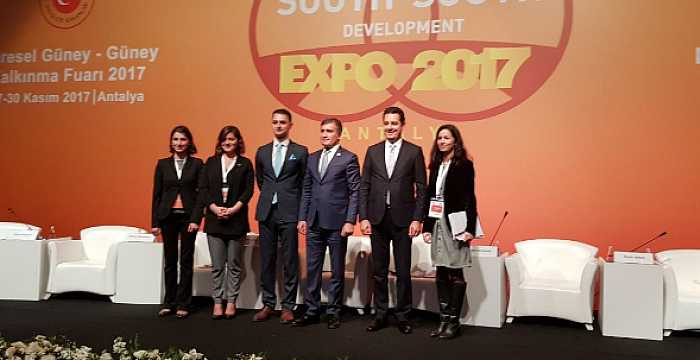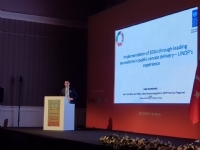In the continuation of the Global South-South Development EXPO 2017, Turkic Council organized in partnership with UNDP the Solution Forum entitled “Good Practices of South-South Cooperation for Implementation of SDGs: Development Through Transformation” on 28 November 2017 in Antalya with the moderation of Ömer Kocaman, Deputy Secretary General of the Turkic Council. The Forum aimed at showcasing successful South-South cooperation examples from the Eurasian region making a transformative impact on the achievement of the Sustainable Development Goals (SDGs). The Forum also targeted to be instrumental in paving the way for new opportunities of South-South cooperation based on the successful models from the region.
The session opened with the welcoming remarks of Deputy Secretary General Kocaman, followed by Rastislav Vrbensky, Deputy Regional Director of Regional Bureau of Europe and CIS of UNDP.
In his opening remarks, underlining the importance that the Turkic Council attaches to the South-South cooperation, Deputy Secretary General Kocaman referred to the joint report of the Turkic Council-UNOSSC entitled “How a regional organization uses South-South cooperation to promote regional and global development”, that summarizes the Council’s activities in this direction. Deputy Regional Director Vrbensky touched upon the ongoing fruitful cooperation of the UNDP with the Turkic Council and underlined the UNDP`s efforts for the attainment of SDGs through the exemplary projects in different areas including the public delivery service.
In setting the tone of the Forum, Deputy Secretary Kocaman expressed that the best practices that have already left a mark or have potential to make a change in Eurasia through the use of South-South cooperation means will be presented during the event. He also highlighted that these practices will focus on three areas such as public delivery service, border gates` modernization and tourism.
The first panelist, Alikhan Baimenov who is the Chairman of the Steering Committee of the Regional Hub of Civil Service in Astana, in his statement, informed the audience about the activities of his institution regarding its contribution to the reforms in public delivery services in Kazakhstan and touched up its regional and cross-regional partnerships through the use of South-South cooperation.
The second panelist Kabira Mammadova who is the Deputy Director of the Department of International Relations at State Agency for Public Service and Social Innovations (ASAN) under the President of the Republic of Azerbaijan, in her presentation, after highlighting ASAN Service`s achievements on the development of public delivery service in Azerbaijan especially through the use of one stop shops, touched the ways they transfer their experience and knowledge to Afghanistan, Indonesia and the Members States of ISESCO.
Following this presentation, Sesili Verdzadze who is the Head of Innovations at ServiceLab, Public Service Development Agency of Ministry of Justice from Georgia provided the audience with the information on the innovations regarding the public delivery service in Georgia which make easier the access for the citizens to all related civil services.
Irakli Kotetishvili who is the Policy Specialist Anti-Corruption and Public Administration, from UNDP Istanbul Regional Hub mentioned about the support that the UNDP provides for the implementation of the projects in the public delivery service area in countries such Azerbaijan, Albania, Uzbekistan, Ukraine, Kosovo and Serbia, in a way to contribute to the achievement of the relevant SDGs.
Ömür Gebeş, General Manager of Customs and Tourism Enterprises Co. Inc. (GTI) from the Republic of Turkey informed the audience about the methods they use for the modernization of the borders gates in Turkey, he also explained their cooperation with countries such as Bulgaria, Georgia, Iraq, Iran and Syria in this field and underlined the importance to modernize the border gates along the Silk Road corridor to facilitate and increase the trade flow in the region.
As the last speaker, Clare Stark, Strategic Planning Specialist of UNESCO mentioned about the support that UNESCO lends to the projects in cultural exchange and preservation of the cultural heritage along the Silk Road with a special focus on the establishment of joint cultural heritage corridors through this destination.
At the end of the Forum, referring to the complementary sides of the exemplary models presented at the event, Deputy Secretary General Kocaman expressed his firm belief for the transfer of these best practices to the other countries in Eurasia and beyond, with the initiation of new South-South cooperation projects.
Deputy Secretary General Ömer Kocaman was accompanied by the Project Directors Ali Civiler, Pelin Musabay Baki and Zhanar Nugumanova at the event.









